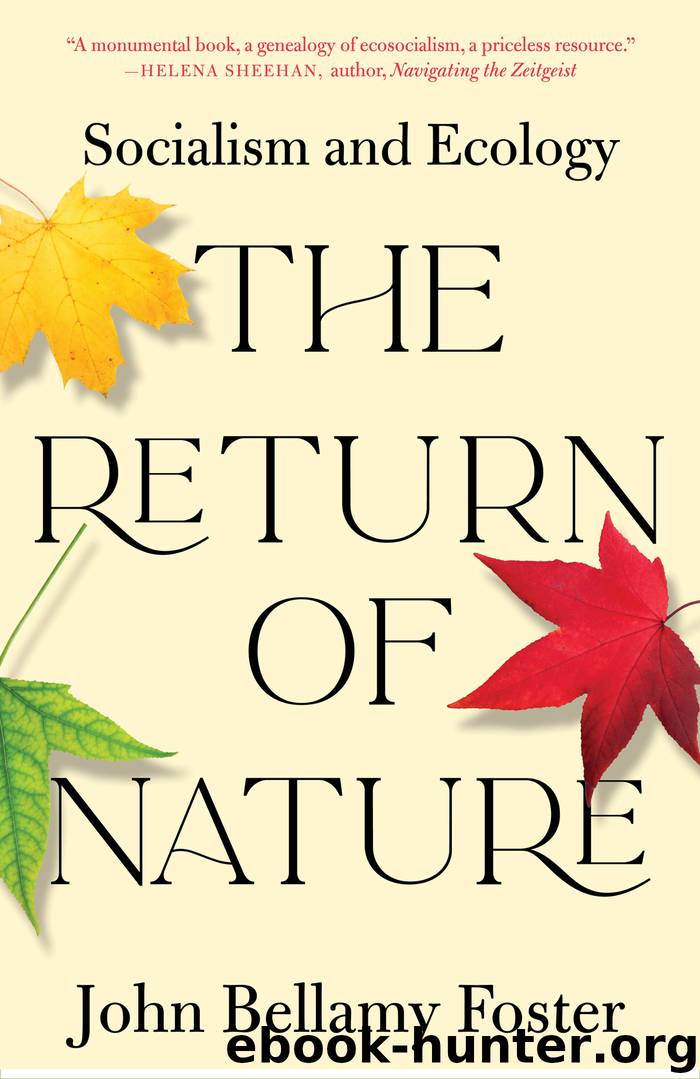The Return of Nature: Socialism and Ecology by John Bellamy Foster

Author:John Bellamy Foster
Language: eng
Format: epub
Publisher: NYU Press
Published: 2020-06-14T16:00:00+00:00
That is, relatively neutral in relation to its environment, and thus a meaningful isolate. Such isolates or abstractions should not, Levy insisted, be given ontological status or be approached in an atomistic, reductionist fashion, where one expects to add up all the partial elements so discovered in order to arrive at the whole. It is precisely this misconception of science, he argued, that was the source of Smuts’s error, which led him to believe that there is some surplus reality, encompassed in “wholes” as ontological realities distinct from atoms, which are then given a false ontological reality. The materialist-scientific method uses abstraction as a method for ascertaining scientific laws whereby nature’s complexes can be isolated for analysis and investigated. Moreover, if there is any meaningful approach to examining nature it lies in recognizing that the world is in a constant state of flux, so that knowledge of it at best is concerned with processes and laws, which hold only at given levels of abstraction. “The environment of which we are an integral part, of which we are a chip, so to speak, is itself in a continuous state of flux.”168
In Levy’s view, a crude holistic philosophy such as that of Smuts, which simply claims that “nature does not proceed by atomic action” but in “wholes,” leads nowhere. “How a self-contained ‘whole’ is not an atom of a larger ‘whole’ it is not easy to see, nor how, with a continuously interrelated changing environment, there can be either wholes or atoms absolutely isolated from the rest of the universe and functioning on their own.” Instead, “to each class of question belongs its appropriate isolate.”169
Emergence in the sense presented by Lloyd Morgan made sense in Levy’s analysis precisely because it recognized that qualitative changes occur through the changing organization of material reality. Here Levy drew on an argument made in ancient times by Epicurus, and made familiar through Lucretius, whereby a literary work was “not … a mere collection of [alphabetical] letters…. [But] as elements are added to elements there emerges from the combination something new.” In another example of emergence Levy pointed out how out of the combination of one atom of oxygen with two atoms of hydrogen there “emerges” a molecule of water, with new characteristics independent of the original gases.170
The analysis of reality in terms of isolates thus requires examining certain levels of organization, or levels of abstraction in which a relatively determinate entity can be ascertained. Knowledge thus tends to be directed at examining “internal relations” within a given isolate or how different systems with different internal relations come to interact. In contrast, “Holists endeavor to bolster an absolutist philosophy of Wholes merely by exposing the inadequacy of Atomism” and thinking that what is needed is the negation of the atom. They are thus “inevitably driven to postulate a mystical and emergent ‘more coming out of the less,’ within the body of these wholes.” There is “a mystical birth” of such wholes “at each stage in the process of aggregation.
Download
This site does not store any files on its server. We only index and link to content provided by other sites. Please contact the content providers to delete copyright contents if any and email us, we'll remove relevant links or contents immediately.
| Anarchism | Communism & Socialism |
| Conservatism & Liberalism | Democracy |
| Fascism | Libertarianism |
| Nationalism | Radicalism |
| Utopian |
The Secret History by Donna Tartt(16690)
The Social Justice Warrior Handbook by Lisa De Pasquale(11501)
Thirteen Reasons Why by Jay Asher(7815)
This Is How You Lose Her by Junot Diaz(5810)
Weapons of Math Destruction by Cathy O'Neil(5064)
Zero to One by Peter Thiel(4845)
The Myth of the Strong Leader by Archie Brown(4800)
Promise Me, Dad by Joe Biden(4463)
Beartown by Fredrik Backman(4453)
How Democracies Die by Steven Levitsky & Daniel Ziblatt(4435)
Stone's Rules by Roger Stone(4430)
The Fire Next Time by James Baldwin(4358)
100 Deadly Skills by Clint Emerson(4097)
A Higher Loyalty: Truth, Lies, and Leadership by James Comey(4047)
Rise and Kill First by Ronen Bergman(4030)
The David Icke Guide to the Global Conspiracy (and how to end it) by David Icke(3901)
The Farm by Tom Rob Smith(3886)
Secrecy World by Jake Bernstein(3795)
The Doomsday Machine by Daniel Ellsberg(3744)
